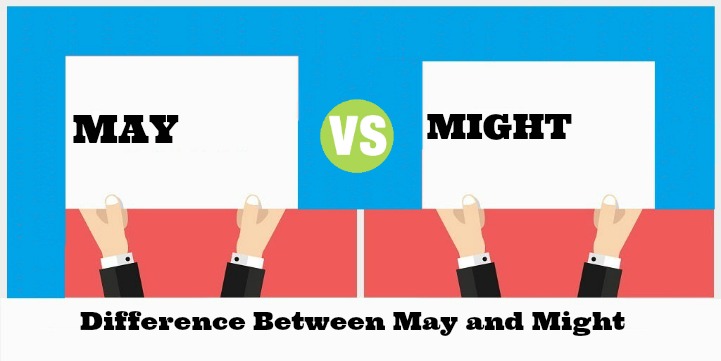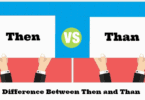What is the Difference Between May and Might
Summary: Difference Between May and Might is that May is a modal verb (those verbs that are used before ordinary verbs and explain possibility, necessity, certainty or permission). May is used to express permission. While Might is also a modal verb. And Might is the past tense of May in indirect speech.

May
Definition of May
May is a modal verb (those verbs that are used before ordinary verbs and explain possibility, necessity, certainty or permission). May is used to express permission.
- May is used to express possibility
- May is used for granting permission
- May is used to express wish or desire
- May is used to show ability while questioning
- May is used to tell the purpose
- May is used to express politeness
- May is used in prayers
- May is used while introducing second point in speech
Examples of May
Used to express Possibility
- This news may or may not be true
- It may rain tomorrow.
Used for Granting Permission
- May I take your bag?
- Yes, you may go to cinema, said the mother.
Used to express Wish or Desire
- May u always be happy!
- May u win the Match!
Used to show Ability while Questioning
- May I help you to complete assignment?
- May I help you in cooking?
Used to tell the Purpose
- I run so I may lose weight
- I work hard so I may get first position.
Used to Express Politeness
- Whose son may this naughty boy is?
- Whose daughter may this beautiful girl is?
Used in Prayers
- Long may you live!
- Winner may you be!
Used while introducing second Point in Speech
- She may be a good wife but very bad daughter in law
- He may be a good examiner but a very strict teacher.
Pronunciation of May
\ˈmā\/meɪ/
Etymology
From Middle English mayen, moȝen, maȝen, from Old English magan, from gem-pro *maganą, from ine-pro *magʰ, *megʰ.
Might
Definition of Might
Might is also a modal verb. And Might is the past tense of May in indirect speech.
- Might is used as a past tense of may
- Might expresses a state contrary to reality
- Might is used as a helping verb to show probability of something
- Might is used to grant permission in the past
- Might is used for making suggestions
- Might is used to express anger / annoyance
- Might is also used for making comparison
- Might is also used when something is not surprising
- Might is also used to pay emphasis
- Might is used for the general mode of thinking of someone
- Might is used to ask for information
Examples of Might
Used as a past tense of May
- They might have attended the wedding party
- You might have written the letter last night.
Expresses a state Contrary to Reality
- She might go with you if she knew your identity
- He might help if he knew you.
Used as a helping verb to show Probability of Something
- Harry might come before it rain
- They thought they might arrive early.
Used to grant permission in the Past
- Teacher was informed that he might take the test
- I might go to my friend’s home, said the mother.
Used for making Suggestions
- I said to my friend, we might go for shopping together
- You might like to see my new car.
Used to express Anger/Annoyance
- In future you might try to be good to others
- You might have informed me about your late arrival.
Used for making Comparison
- The efforts you are making might be small but they can help those needy people a lot
- The money you are giving in charity might be small but it’s still worth giving.
Used when Something is not Surprising
- I might have guessed it was your car
- I might have known it was your call when the telephone rang.
Used to Pay Emphasis
- You might ask him, from where is he earning?
- Where has you spent all money? You might well as.
Used for the general mode of thinking of Someone
- I still remember your wedding day, that might be Sunday
- I remember when u slapped your wife, it might be 2 years after my son was born.
Used to ask for Information
- How might I get good marks?
- Who might be taking test?
Pronunciation of Might
/maɪt/ /maɪt/
Etymology
From Middle English might, myghte, (also maught, macht, maht), from Old English miht, mieht, meaht, mæht, from gem-pro *mahtiz, *mahtuz, from ine-pro *mógʰtis, *magʰ-, corresponding to Germanic *maganą + *-þiz.
Tips
Now-a-days to deny permission we often use cannot instead of may not. This usage is probably encouraged by the fact that the contraction can’t is easier to say than the contraction may not.
Might and May
Might shows less possibility than may.
Compare:
- It may rain. (Maybe a 50% possibility)
- It might rain. (Maybe a 30% possibility)
Notes
May and might are followed by an infinitive without to.
- He may come. (NOT He may to come).
- I might pass.(NOT I might to pass).
Questions and negatives are made without do.
- May I go? (NOT Do I may go?)
There is no -s in the third person singular.
- She may pass. (NOT She may passes).
May vs Might
MAY
Modal Verb.
Definition
May is used to express possibility’ for granting permission’ to express wish or desire, to show ability while questioning, to tell the purpose, to express politeness, in prayers, while introducing second point in speech.
Etymology
From Middle English mayen, moȝen, maȝen, from Old English magan, from gem-pro *maganą, from ine-pro *magʰ, *megʰ.
Pronunciation
\ˈmā\/meɪ/
Examples
It may rain tomorrow
May I take your bag?
May u always be happy!
May I help you to complete assignment?
I work hard so I may get first position
Whose son may this naughty boy is?
Long may you live!
He may be a good examiner but a very strict teacher.
MIGHT
Modal Verb.
Definition
Might is used as a past tense of ‘may’, expressing a state contrary to reality, as a helping verb, to grant permission in the past, for making suggestions, to express anger / annoyance, for making comparison, when something is not surprising, to pay emphasis, for the general mode of thinking of someone, to ask for information.
Etymology
From Middle English might, myghte, (also maught, macht, maht), from Old English miht, mieht, meaht, mæht, from gem-pro *mahtiz, *mahtuz, from ine-pro *mógʰtis, *magʰ-, corresponding to Germanic *maganą + *-þiz.
Pronunciation
/maɪt/ /maɪt/
Examples
You might have written the letter last night
He might help if he knew you
They thought they might arrive early
I might go to my friend’s home, said the mother
You might like to see my new car
You might have informed me about your late arrival
The money you are giving in charity might be small but it’s still worth giving
I might have known it was your call when the telephone rang
Where has you spent all money? You might well as
I remember when u slapped your wife, it might be 2 years after my son was born
Who might be taking test?
How might I get good marks?







Leave a Comment
You must be logged in to post a comment.